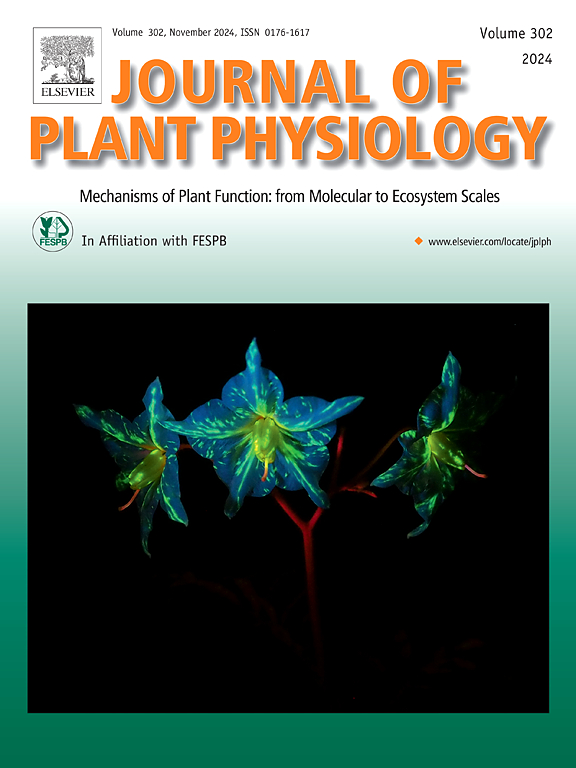植物生长促进根瘤菌在可持续农业中的作用:应对环境和生物挑战
IF 4.1
3区 生物学
Q1 PLANT SCIENCES
引用次数: 0
摘要
本文综述了促进植物生长的根瘤菌(PGPR)在解决各种环境和生物问题方面的重要性。PGPR帮助作物抵御盐碱、营养缺乏和干旱压力,同时应对农业威胁。可持续农业的出现是对农业实践所面临的社会和经济问题的回应。植物会遇到阻碍其生长的生物压力源,如细菌、病毒、线虫、蛛形纲动物和杂草。此外,PGPR通过改善养分吸收和防御害虫来促进植物生长。枯草芽孢杆菌利用间接方法对抗疾病,保护植物免受各种病虫害的侵害。此外,PGPR作为一种生物肥料,在世界各地减轻干旱对作物的影响。本文综述了在现实条件下提高生产效率和提高生物孕育剂效率的策略。PGPR通过影响植物防御机制,启动系统抗性反应,调节与病原体检测和防御信号通路相关的基因表达,证明了其在对抗威胁中的作用。它通过抑制有害微生物的增殖,同时促进有益微生物的相互作用来维持平衡的根微生物群。尽管转基因带来了技术和伦理方面的挑战,但将转基因生物整合到农业方法中为可持续农业带来了希望。随着气候变化的影响越来越大,PGPR在提高作物抗灾能力、提高土壤质量和减少对合成农业投入物的依赖方面发挥着至关重要的作用。本文章由计算机程序翻译,如有差异,请以英文原文为准。
Role of plant growth-promoting rhizobacteria in sustainable agriculture: Addressing environmental and biological challenges
This review underscores the importance of plant growth-promoting rhizobacteria (PGPR), fostering sustainability to address various environmental and biological issues. PGPR helps crops withstand salinity, nutrient deficiencies, and drought stress while tackling agricultural threats. Sustainable agriculture has emerged as a response to the social and economic problems farming practices face. Plants encounter obstacles from biotic stressors such as bacteria, viruses, nematodes, arachnids, and weeds that impede their growth. Furthermore, PGPR enhances plant growth through improved nutrient absorption and defense against pests. Bacillus subtilis utilizes indirect methods to combat diseases and protect plants from various diseases and pests. Additionally, PGPR acts as a bio-fertilizer that mitigates drought stress effects on crops in various regions worldwide. This review proposes strategies to boost productivity and improve bio-inoculant efficiency under real-world conditions. PGPR demonstrates its role in combating threats by influencing plant defense mechanisms, initiating systemic resistance responses, and regulating gene expression related to pathogen detection and defense signaling pathways. It maintains a balanced root microbiome by suppressing harmful microbial proliferation while promoting beneficial microbial interactions. Despite the challenges posed by technology and ethical considerations surrounding their modification, integrating PGPR into farming methods holds promise for sustainable agriculture. Given the increasing impact of climate change, PGPR plays a crucial role in improving crop resilience, enhancing soil quality, and reducing dependence on synthetic agricultural inputs.
求助全文
通过发布文献求助,成功后即可免费获取论文全文。
去求助
来源期刊

Journal of plant physiology
生物-植物科学
CiteScore
7.20
自引率
4.70%
发文量
196
审稿时长
32 days
期刊介绍:
The Journal of Plant Physiology is a broad-spectrum journal that welcomes high-quality submissions in all major areas of plant physiology, including plant biochemistry, functional biotechnology, computational and synthetic plant biology, growth and development, photosynthesis and respiration, transport and translocation, plant-microbe interactions, biotic and abiotic stress. Studies are welcome at all levels of integration ranging from molecules and cells to organisms and their environments and are expected to use state-of-the-art methodologies. Pure gene expression studies are not within the focus of our journal. To be considered for publication, papers must significantly contribute to the mechanistic understanding of physiological processes, and not be merely descriptive, or confirmatory of previous results. We encourage the submission of papers that explore the physiology of non-model as well as accepted model species and those that bridge basic and applied research. For instance, studies on agricultural plants that show new physiological mechanisms to improve agricultural efficiency are welcome. Studies performed under uncontrolled situations (e.g. field conditions) not providing mechanistic insight will not be considered for publication.
The Journal of Plant Physiology publishes several types of articles: Original Research Articles, Reviews, Perspectives Articles, and Short Communications. Reviews and Perspectives will be solicited by the Editors; unsolicited reviews are also welcome but only from authors with a strong track record in the field of the review. Original research papers comprise the majority of published contributions.
 求助内容:
求助内容: 应助结果提醒方式:
应助结果提醒方式:


